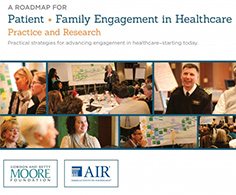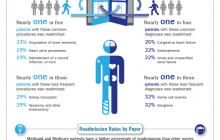First Do No Harm: Patient Safety Awareness
 Advances in patient safety encourage patient engagement, systems improvement, more effective communication and better risk assessment.
Advances in patient safety encourage patient engagement, systems improvement, more effective communication and better risk assessment.
Since the 1999 landmark Institute of Medicine report To Err is Human galvanized public attention with estimates that medical errors kill up to 98,000 patients every year, awareness of patient safety issues has increased dramatically. But a 2013 study indicates the U.S. death toll from preventable medical errors likely is even higher—with more than 1,000 Americans dying every day, medical errors are the No. 3 cause of death behind only heart disease and cancer, according to the Journal of Patient Safety.
Preventable medical errors range from hospital-acquired infections to medication errors, from surgical errors to miscommunications that lead to incorrect or delayed care, and from errors in diagnosis to premature hospital discharge. Among the greatest advances in patient safety is the growing recognition that medical errors are primarily the result of bad systems, not individual misbehavior or actions. Engaging caregivers, patients, and families in patient safety issues can help raise awareness and prevent medical errors.
Patient Safety Awareness Week March 8-14
 Patient Safety Awareness Week, sponsored by the National Patient Safety Foundation (NPSF), is March 8 to 14, 2015, and focuses on the role of patient engagement in improving healthcare safety. According to NPSF, “Enhanced communication begins with an informed and engaged patient and helps to lead to safer care.”
Patient Safety Awareness Week, sponsored by the National Patient Safety Foundation (NPSF), is March 8 to 14, 2015, and focuses on the role of patient engagement in improving healthcare safety. According to NPSF, “Enhanced communication begins with an informed and engaged patient and helps to lead to safer care.”
As part of this year’s United in Safety theme, NPSF is featuring A Roadmap for Patient Engagement in Healthcare Practice and Research, a set of eight change strategies, including tactics and resources to implement the strategies, available online. The Roadmap was created by the American Institutes for Research in collaboration with the Gordon and Betty Moore Foundation to develop effective partnerships at all levels of healthcare.
Increasing Healthcare Safety
Along with developing the Roadmap for Patient Engagement, many other AIR projects focus on increasing healthcare safety through improved patient engagement, health care systems improvement, and better risk assessment. Additionally, public quality reports help patients and families make more informed decisions about where to get care. Learn more about these strategies to improve patient safety and engagement:

